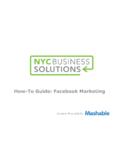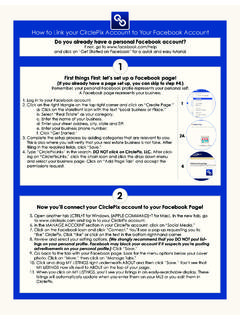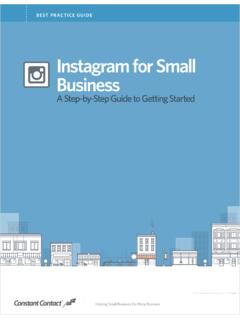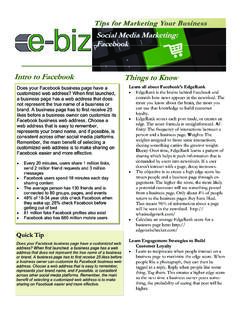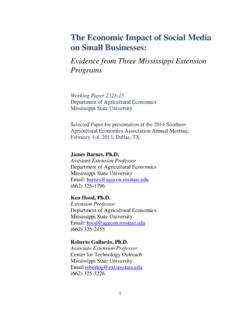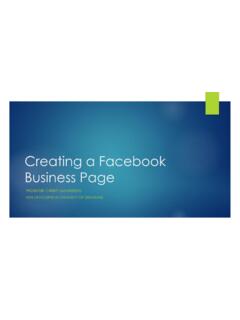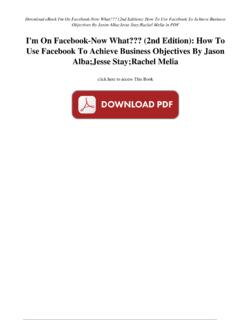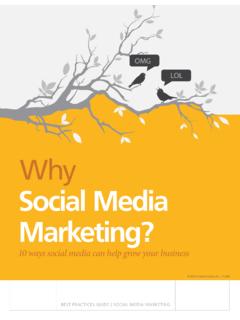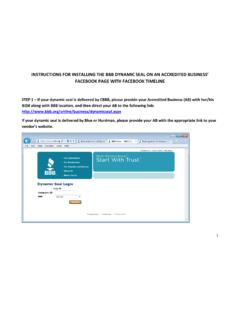Transcription of Facebook Case Study - Wayan Vota
1 Facebook case Study Nikki Batchelor Daniel Houston Suzanne Larson Sunil Nanjundaram Wayan Vota George Washington University School of business business Ethics Facebook case Study In November 2007, social media giant, Facebook pushed the limit of online marketing by introducing a controversial marketing ploy, the Beacon tool. Using Beacon to track user browsing data and purchases from partner sites, Facebook then broadcast this information to the user s network. The tool immediately drew criticism from the online community, claiming violation of privacy and breach of user agreement by the company. The moral issue of the case centers on privacy concerns of the new online advertising tool, Beacon, which is embedded into a Facebook partner s website ( Blockbuster, Overstock, and The New York Times).
2 The tool recorded a Facebook user s Internet activity and transmitted this activity back to Facebook , which then publicizes it across a user s Facebook network. Beacon was applied to all Facebook users by default, and then users were prompted to opt-out with a discrete opt-out notice to block Beacon s 3rd party data communication. Unless the user opted-out quickly, sensitive user activity was broadcast to a Facebook user s News Feed. Users also had to visit each of the 44 Beacon affiliate Web sites, and opt out of the program on each site individually (Gohring, 2008) to stop those partner sites from transmitting user data back to Facebook .
3 Users were not permitted to disable all data sharing activity and Beacon tracked activity every time Facebook users accessed a partner website. Seeking new revenue to justify the company s recent exorbitant valuation and bring additional money to shareholders, this tool promised potential financial innovation. What is the choice or decision to be made? The moral dilemma Facebook faces is to determine how to deal with the conflict the company s new Beacon product has with its own mission statement - to ensure users have jurisdiction over their own private information. In addition, to ensure that Facebook can continue to exist as a free service, its management must also determine how to generate revenue from the millions of Facebook users, as the market demands.
4 Relevant Facts User Privacy- According to the case , Facebook differentiated its service from its main competitor, MySpace, by offering various privacy settings and requiring users join using a real name. The company also offered control over which personal information was available to others. In addition, the company stated organizational principles as: 1.) an individual should have control over his or her personal information and 2.) an individual should have access to the information others want to share. Financial background- Although Facebook reported a user base of more than 80 million active users, the company obtained a relatively anemic $125 million in ad revenue in 2007, roughly one-fourth of the company s main competitor, MySpace.
5 Facebook s small advertising revenue was also magnified by Facebook s massive valuation of $15 billion, or 500 times earnings, placing an extraordinary emphasis on short term profits to justify that valuation and the company s bottom line. What additional information is needed? In order to better understand the impact of the company s decisions, answers to the following questions would be useful in determining Facebook s best path forward: Did Facebook intentionally make Beacon hard to opt out of? Did Facebook violate any legal rights of users ( sharing medical information, breach of contract, etc)? What was the opt-out rate, ratio, or aggregate number of opt-outs?
6 What was the percentage of Beacon prompts not disabled? What was the number of users with Beacon broadcastings? What was the revenue generated from the Beacon tool? What other revenue options did Facebook have in lieu of Beacon? Key Decision Stakeholders Primary Facebook Interests - Generating new income, gaining greater social media market share, increasing the user base, aligning organizational mission with delivery Power - Delivering a free service, leading social media product, personal information of over 80 million users, significant disposable income Facebook users Interests - Protection of profile privacy, a functional social media product Power - Switch to other social media sites, influence over followers Secondary A Facebook user s network Interests - Access to user s network, protection of privacy Power - Influence over other Facebook users.
7 Consumer influence Advertisers Interests - Reaching Facebook consumers, access to personal user data, generating revenue, brand awareness Power - Funding for advertisements, using other social media/advertising outlets, influence over Facebook s business decisions Enforcing organizations Interests - Protecting the rights of consumers, prosecuting illegal business Power - Intervention and litigation Social media competitors (Myspace) Interests - Gaining social media market share, profit generation Power - Greater advertising revenue, greater transparency with site advertising, attracting dissatisfied Facebook users List of Available Alternatives Facebook is faced with three sets of alternatives.
8 Namely, Option 1 keep Beacon s involvement with Facebook the same; Option 2 modify it; or Option 3 cancel it altogether. Options 1 and 3 are straightforward, however, Option 2, to modify Beacon s involvement with Facebook , has many subsets of alternatives. Facebook can make opt-out preferences more clear and noticeable, provide incentives for users to allow Facebook to transmit their data to Beacon, permit users to opt out of Beacon if they are willing to pay financially, or restructure Beacon to function as an opt-in service. If Facebook chooses to modify the Beacon plan by making opt-out alternatives transparent and easy to access, they will be shifting their emphasis to giving consumers all of the information up front.
9 Users would be able to make an informed decision as to what degree, if any, Beacon will be allowed to track them, and whether this information is shared with any of their friends. Offering incentives, such as access to additional application features, financial incentives, or viewing preferences on their Facebook page may be enough motivation for users to allow Beacon to track their website viewing history and publish their recent purchases. This alternative must focus on making the incentives beneficial enough for users to convince many to allow Beacon to continue to track them.
10 Facebook could require users to start paying for their service if they opt-out of Beacon. Or similarly, they could join the likes of Pandora and Amazon s Kindle line of tablets that allow users to, for a fee, opt-out of advertising, or in this case , Beacon. Lastly, Beacon could be implemented similarly to how users already broadcast all of their other information on Facebook , on a voluntarily basis only. By opting-in to Beacon, users could have their information shared at their own free-will, just like users willingly show that they have checked-in at a location or liked a group. The Option 2 subsets all have a focus on giving the user more control.
